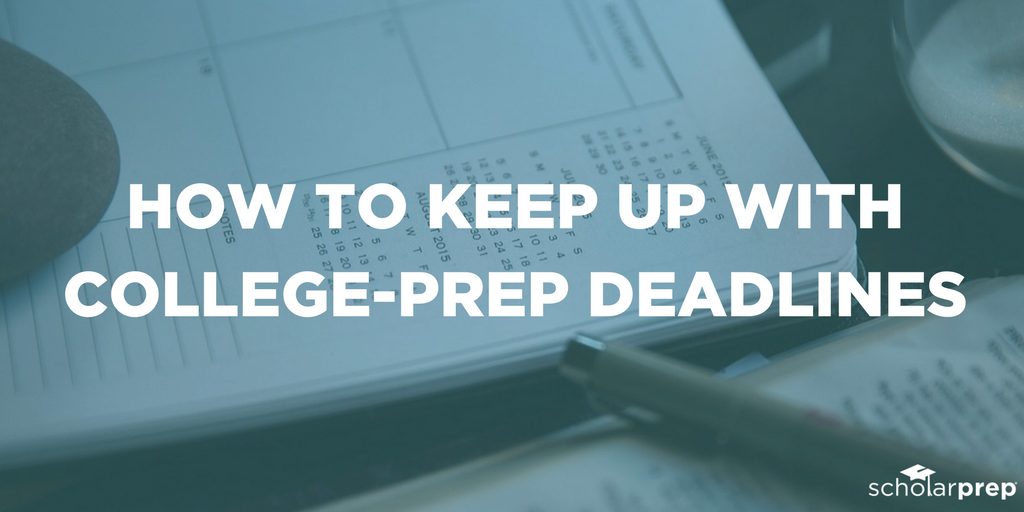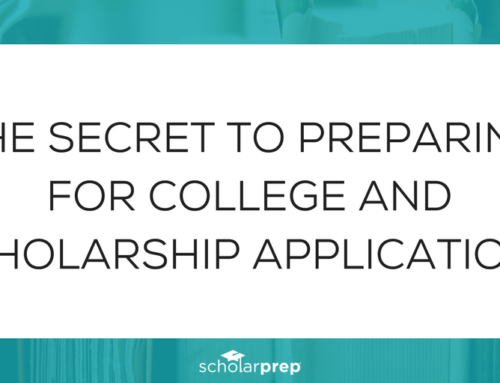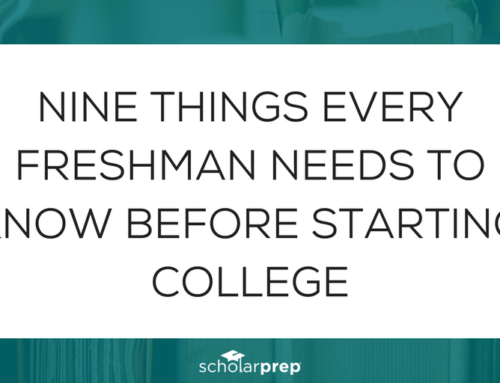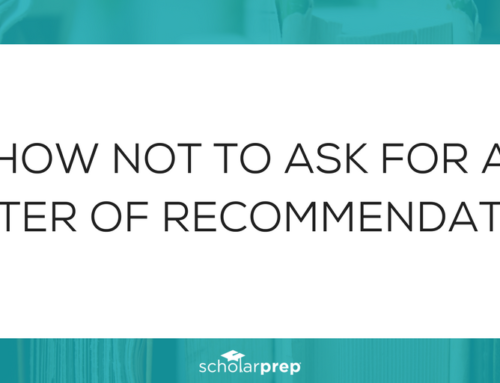Keeping up with deadlines for college applications, standardized tests, financial aid, and scholarships are imperative. Deadlines are not suggestions. In school, students may get a slap on the wrist or a small penalty to their grade for missing a homework assignment due date. This is not the case when it comes to college-related deadlines; they are in place for a reason and should not to be challenged.
4 Quick Tips for Meeting Deadlines
- Set a faux-deadline. Even if you are diligent about keeping up with deadlines, things can come up. If you set a fake deadline a week or two earlier, this will give you a buffer for unexpected delays or issues.
- Use whatever system works best for you. If it is easiest for you to keep up with tasks and deadlines by using a paper planner or wall calendar, use that method for everything college related. If a digital system with calendar reminders works better, then enter all of your deadlines and tasks into your digital calendar.
- Make a monthly commitment to planning for college. Each month, sit down to go over your ScholarPrep Organizer. Look at your monthly tasks and deadlines and review your progress. Meeting on a monthly basis will ensure that you are on track and that nothing is forgotten or missed.
- Break everything down into steps, each with their own deadline. This will give you enough time for each step to be completed well before the final deadline. College and scholarship applications will require letters of recommendation, test scores, and other information you need to request from school officials or teachers. Build each of these tasks into the process.
BONUS TIP: Don’t try to tackle it all two weeks before the deadline. Breaking down the requirements into manageable steps will make the process less stressful and will help you feel in control of the situation.
Standardized Tests
- Testing dates are set a year in advance. Determine your availability and register for the exams ahead of time.
- Begin no later than the fall of your junior year to ensure opportunities of retesting if you haven’t met your score goal. Test results normally take 4 weeks so take that into account as you are completing applications that require your test scores. Give yourself plenty of time before they are needed for a deadline.
- Tests need to be taken no later than December of your senior year to meet most college application deadlines. However, if you plan on applying early or trying to win scholarships, you need to have your test scores much earlier.
BONUS TIP: Start taking the ACT/SAT as soon as possible, giving yourself ample time to obtain the score you desire.
College Application Deadlines
- Early Action: Some colleges send acceptance letters as early as December if students complete their application by November 1.
- Regular Decision: Most schools have a January 1 or 15 deadline for the college application, letting students know acceptance by March or April.
- Rolling Admissions: Some colleges don’t have one set deadline. These schools open applications up in the fall and have a final date in the spring. Applications are reviewed on a rolling basis, but applying early in the year means learning your status earlier. This is helpful if you’re not admitted to your top choice(s) and need to apply elsewhere.
BONUS TIP: Most college applications will require a personal essay. Start working on this before your senior year rolls around. Having it ready at the beginning of your senior year will give you an advantage for scholarships and it will be one less thing to worry about during application season. The essay should be viewed and edited by a teacher, another adult and/or peers to check for spelling, grammar, and content.
Scholarship Deadlines
- Deadlines will vary.
- Keep track of scholarship deadlines and details using our Scholarship Tracking Spreadsheet below.
- Set reminders on your phone for a week or two before the deadline.
Get our FREE Scholarship Tracking Spreadsheet:
BONUS TIP: Many scholarships go unawarded because people do not apply for them. Don’t let missing a deadline keep you from winning free money for your college education!
Financial Aid
- EVERYONE should complete the FAFSA, even if you don’t think you will qualify for aid. Filing the FAFSA is often a requirement for scholarship applications. They want to see that you are exhausting all of your options.
- The FAFSA becomes available on October 1. Complete it as soon as possible once it becomes available.
- The FAFSA site tells you which tax year to use when you file.
BONUS TIP: Federal financial aid is like a big pot of money and is first come, first serve. Even if you are very deserving of grant money, the longer you wait to submit the FAFSA, the less funds you will receive. Be diligent and complete the FAFSA ASAP!
Letters of Recommendation
- You can begin requesting general letters of recommendation as early as you want. Many times, these can be saved and attached to applications in the future. Even if you won’t need the letter for awhile, it is helpful to ask while the person has a recent memory of you. This will make it easier for them to write you a great letter. You can always go back to them and ask for an updated letter.
- Offer a resume or tips to your recommenders to make writing the letter less of a hassle. Telling them what the letter is for and what you want them to mention in the letter is helpful and it will ensure a higher quality recommendation.
- Request the letters at least one month in advance – earlier if possible. The adults in your life are busy and may not have time to sit down and write one immediately. This cushion will ensure you get the letter before the application deadline.
BONUS TIP: When someone writes you a letter of recommendation. Have them send you a digital copy of the letter (word document). Then, when you need an updated version, you can provide them with the original!
Meeting deadlines for applications, financial aid and scholarships is an essential part of preparing for life after high school. Taking this part of the process seriously will ensure that you don’t miss out on opportunities – after all, this is your future we are talking about! Making a monthly commitment to planning, using your ScholarPrep Organizer, setting reminders and even tricking yourself by creating fake deadlines will help you stay on top of all the tasks that need to be completed.
Have you written all of your deadlines down? What is your organizational method for keeping up with the various deadlines? Comment below. We would love to hear from you!












